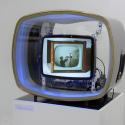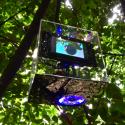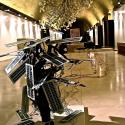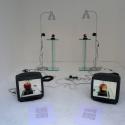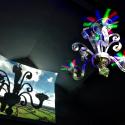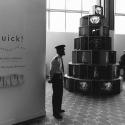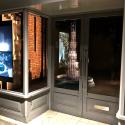Biography
Born in Essex in 1952, Chris Meigh-Andrews is an artist, video historian, writer and curator and Professor Emeritus of Electronic & Digital Art at the University of Central Lancashire. After primary and secondary education and early employment in Montreal as an AV technician and photographer, he returned to the UK where he studied Film and Television at the London College of Printing (Higher Dip, 1976-79), fine art at Goldsmith’s (MA, 1981-1983) and completed a PhD at the Royal College of Art (1996-2001).
Art Practice
Considered by many to be a pioneer in the development of video art and digital moving image in the UK, he has been exhibiting his video and installations internationally since the mid-1970’s, his early single screen video works have been featured in a number of key exhibitions: “Short Histories of Video Art, (Part 2)”, John Hansard Gallery, Southampton, 2004; “Electric Eyes: British Artists’ Video 1985-88”, Tate Gallery and the Institute of Contemporary Art (ICA), London; Museo de Arte Moderno, Medellin, Columbia, Akademie der Bildenden Kunst, Vienna 1988; “Genlock”, Interim Arts, London, (& Touring) 1988; “Video from the 70’s and 80’s”, Doggerfisher, Edinburgh, 2008; “Analogue: Pioneering British, Canadian and Polish Artists’ Video”,(1968-88), Tate Britain, Anthology Film Archives, New York, the Foundation for Art & Creative Technology (FACT), Liverpool, Museum of Contemporary Canadian Art, (MOCCA),Toronto, Arsenal Institute fur Film und Videokunst, Berlin, and the Centre for Contemporary Art, Warsaw, 2007-08 and “The Self & Surroundings”, Dundee Contemporary Arts Centre, 2012. His early video work also features in two recent DVD collections: “Rewind and Play: An Anthology of Early British Video Art”, Lux/Rewind, (2009) and “New Contemporaries Moving Image: 1968-2010”, Bloomberg/New Contemporaries, (2014).
Meigh-Andrews has held numerous artist-in-residence posts in the UK, Canada and Europe and he was Arts Council International Artist Fellow, Krakow, Poland, (2003-2004). Examples of his single screen video, installation and photographic work are held in a number of national collections including the Victoria and Albert Museum, London; the Muzeum Historii Fotografii, Krakow; The Harris Museum and Art Gallery, Preston; The Scottish Screen Archive at the National Library of Scotland; The British Artists’ Film & Video Collection and the Lux Collection, as well as in a number of private collections. Most recently, documentation of his early video and installation work and a substantial archive of his photographs, papers, notes and writings have been acquired by the archive and library at Tate Britain.
Commissions
His commissioned and site-specific video and sound installations often feature renewable energy including wind and solar power. His solar-powered installation For William Henry Fox Talbot (The Pencil of Nature ) was commissioned for Digital Responses at the Victoria and Albert Museum, London in 2002. He was the recipient of a research award from the National Endowment of Science, Technology and the Arts (NESTA) in 2004 as part of a commission to develop Interwoven Motion, a prototype self-powered outdoor video installation in Grizedale Forest and at the Foundation for Art and Creative Technology, (FACT) Liverpool. His installation, The Monument Project (Si Monumentum Requiris, Circumspice), commissioned by architects Julian Harrap, produced a continuous stream of weather responsive panoramic digital images from the top of the Monument in the City of London 24 hours, 7 days per week for three years (2009-2011). More recent work includes Aeolian Processes II (Box Revealing the Sound of its Own Making), New South Wales, Australia (2014). In Darwin’s Garden, an augmented-reality installation, produced in association with the National Trust, was featured in the Leonardo Electronic Almanac, and at the Kasa Gallery, Sabinsi University, Istanbul, (2012) and Oriel Sycarth, Wrexham (2017), and For Issac, Alan & Steve (2017), Future Now: Aesthetica Art Prize: 100 Contemporary Artists, York Art Gallery, (2017). His recent solo show, The Sky is For All at the Ruskin Gallery, Cambridge, premiered his multi-screen panoramic video installation Climbing Mount Ishzuchi in the Autumn, (2019).
Writing & Publications
Meigh-Andrews has written extensively on the history and context of artists’ video. His influential and widely-consulted book, A History of Video Art: the Development of Form and Function, was published by Berg, Oxford and New York in 2006 and was translated into Japanese and published by Sangensha, Tokyo,in 2013. The book, which provides an historical analysis and overview of the development of artists’ video since its inception, has made an major contribution to the international impact made by artists working in the UK. An enlarged and expanded 2nd edition of the book was subsequently published by Bloomsbury in 2013, and was translated into Mandarin and published by China Pictorial Publishing House, Beijing in 2018. He has contributed chapters to a number of books including: “Digital Moving Image Installations and Renewable Energy: 1994-2018”, in Earnshaw R.A. Liggett S. Excell P.S. and Thalmann D (eds), Technology, Design and the Arts – Challenges and Opportunities, Springer Books, Cham, Switzerland, (forthcoming, 2020). “The Emergence of Early Artists’ Video in Europe and the USA and its Relationship to Broadcast TV”, Materializing Memories: Dispositifs, Generations, Amateurs, Bloomsbury, 2018; “Location & Dislocation, Site & Architecture: Video Installation by Palestinian Artists”, Palestinian Video Art: Constellation of the Moving Image, Bashir Makhoul, ed, Palestinian Art Court-al Hoash, Jerusalem, 2013. “Optiks: Peter Campus”, and “In Conversation with Michael Snow”, The BFI Gallery Book, British Film Institute, London 2011 and “Video Installation in Europe and the USA: The Expansion and Exploration of Electronic and Televisual Space: 1968-1988”, Expanded Cinema: Film, Art, Performance, Tate Publications, London 2011;“Interwoven Motion: steps towards a semi-permanent outdoor self-powered video installation”, The Itemisation of Creative Knowledge, FACT/ Liverpool University Press, 2006; “The Vasulka Tapes”, Vasulka Lab 1969-2005-Live Archive, Vivid, Birmingham, 2006; “Chris Meigh-Andrews: Early Video Tapes: 1978-87”, Experimental Film and Video, Jackie Hatfield, ed., John Libby Publishing. 2006. Meigh-Andrews is currently Editor-in-Chief, UK and Europe of the forthcoming three-volume Encyclopedia of New Media Art for Bloomsbury Academic, to be published 2025.
Curatorial
Meigh-Andrews has curated a number of significant international exhibitions and symposia including The Digital Aesthetic (2001, 2007 & 2012) in collaboration with the Harris Museum, Preston and Analogue: Pioneering Artists’ Video from the UK, Canada and Poland (1968-88), presented at Tate Modern and Tate Britain and touring to venues in Liverpool, Norwich, Warsaw, New York, Toronto, Ottawa, Valletta and Berlin with funding from Arts Council England, the Polish Cultural Commission and the Canada Council for the Arts. He co-curated Yes, Snow Show, showcasing recent digital work of renowned Canadian artist Michael Snow at the British Film Institute, London. In 2010 he was awarded a Diawa Foundation travel grant to visit Tokyo, Kyoto and Nagoya to research into early artists' video in Japan.
Teaching
Beginning in the 1980’s Meigh-Andrews taught at a number of art schools and institutions including The London College of Printing (1980-82), The London International Film School (1981-84), Maidstone School of Art (1989-91) and Leicester Polytechnic. (1991-93). However, his most influential and significant teaching role was at the University of Central Lancashire (UClan) (1984-2012). Whilst working at UClan he initiated and was head of Time-Based Media (1986-2000), co-founded the MA Fine Art course and in 2004 established the Electronic & Digital Art Unit (EDAU), a centre for post-graduate research. He was made Reader in 2000, Professor in 2007 and Professor Emeritus on his retirement from teaching in 2012. From 2013-2017 Meigh-Andrews was Visiting Professor at the Centre for Moving Image Research, Faculty of Arts, Creative Industries and Education at the University of the West of England (UWE).
Consultant and Advisor
His expertise in the field has been acknowledged on many occasions and he has been an advisor on numerous committees and panels. He was External Advisor, MA Creative Technology, University of Salford, (2012), he served on the International Advisory Committee, for “Rewire, 4th International Conference on the Histories of Media Art, Science and Technology, FACT, Liverpool and on the Validation Panel, MA Creative Media Practice, at Manchester Metropolitan University, (2009); MA Fine Art, Liverpool John Moores University, (2008). He was Curatorial Policy Advisor for Vivid, Birmingham, (2007-2010), and was a member of the Advisory Board, of the “British Artists’ Film and Video Study Collection”, at Central St Martins, University of the Arts, London (2008-09). He was External advisor, MA Fine Art, Site & Place, Liverpool John Moores University, (2008); Film & Video advisor, for North West Arts: (1997-2001); External Advisor, BA (Hons) Film and Electronic Media, Gloucester College, 1992. Meigh-Andrews served on the Board of Trustees, for Merseyside Moviola, Liverpool: 1992-94 and was appointed a Member of the Council for National Academic Awards (CNAA) in 1991. He was a member of the Board of Management for London Video Access (1979-82 ) and served as its Chairman (1987-89).
Meigh-Andrews has been appointed external examiner for numerous university fine art courses including MA, Creative Media Arts and BA Digital Media Design, Bournemouth University, (2017-19); MA Digital Arts, University of Malta, (2016-2019); MA Photography: Contemporary Dialogues, Faculty of Art & Design, University of Wales, Trinity St David, (2015-2018); Critical and Historical Studies, University for the Creative Arts, Kent, (2011-2013); BA Fine Art, New Media, University College Chester, 2002-06; MA Digital Arts, Camberwell College of Art, University of the Arts, London. 2001-2006 and Time-Based Arts, BA (Hons) Fine Art, University of Dundee, Duncan of Jordanstone College of Art and Design, (2000-2004).
Due to his expertise and early involvement in the development of “Practice-based” PhD research in his role at the University of Central Lancashire, he has also served as an examiner of MPhil and PhD research, both in the UK and internationally including at the Manchester Metropolitan University, (2020), the University of Malta, (2018-2019); Swinburne University of Technology, Victoria, Australia (2018); University of Westminster, (2016), Nottingham Trent University, (2015); the Royal College of Art, London. (2012); Central St Martins College of Art & Design, University of the Arts, London. (2012); Duncan of Jordanstone College of Art and Design, University of Dundee, (2011) and Leeds University, (2009-10.)
Meigh-Andrews is also active in his local community. He was director of Cuckoo Farm Studios Ltd., an affordable artist’s studio complex in Colchester, and was also chair of the management committee (2021-23) . He has also served as an expert adjudicator at debating and public speaking events at local secondary schools for the English Speaking Union.
